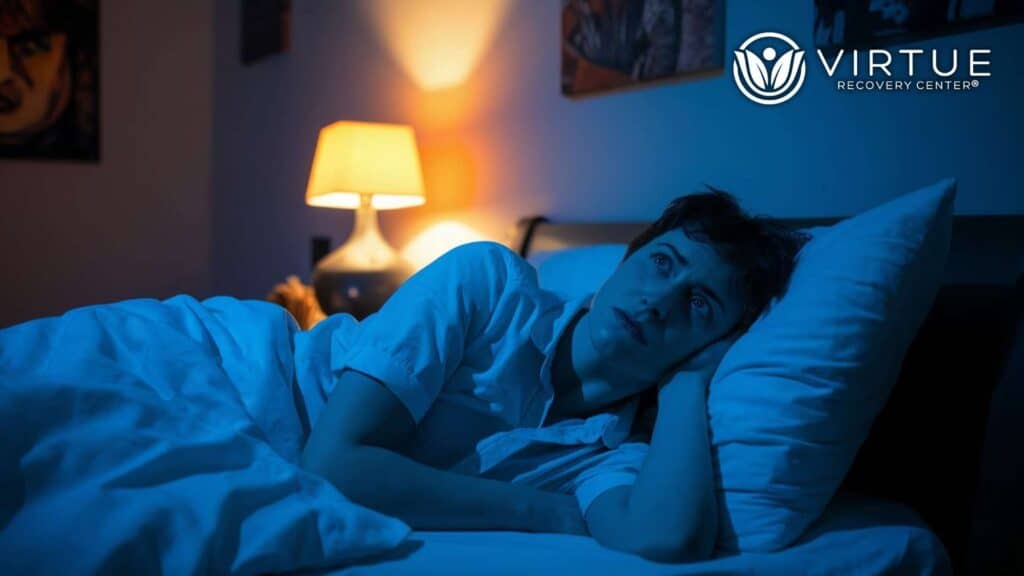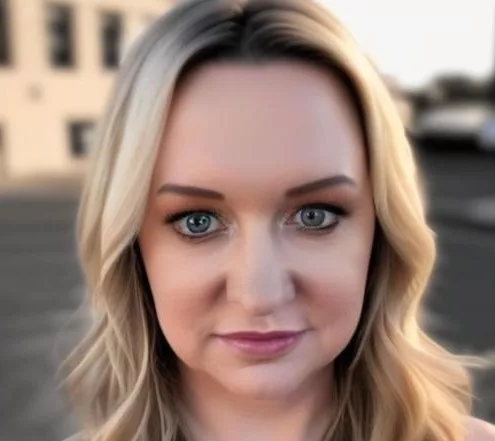Key Takeaways
- Sleep and Substance Use Disorders are Linked: Poor sleep quality can increase substance abuse, while substance use worsens sleep problems.
- Common Sleep Issues: Conditions like insomnia, sleep apnea, and REM sleep disruption are common in those with substance use disorders.
- Sleep Deprivation Can Trigger Relapse: Lack of sleep can lead to stress and cravings, increasing the risk of relapse.
- Treating Both is Important: Addressing both sleep disorders and substance use together helps in long-term recovery.
- Professional Help is Key: A comprehensive treatment plan that improves sleep can help people maintain sobriety.
Introduction
Did you know that sleep disorders and substance use disorders are deeply connected? When people struggle with sleep problems like insomnia or sleep apnea, they are more likely to turn to substances like alcohol or drugs to cope. At the same time, substance use can disrupt sleep patterns, making it harder to get restful sleep. This creates a vicious cycle that can make recovery from addiction more difficult. Understanding the relationship between sleep and substance use is critical for improving both sleep health and addiction recovery.
Relationship Between Sleep Disorders and Substance Use
The relationship between sleep disorders and substance use disorders is complex but undeniable. Many people with substance use disorders experience sleep disturbances that affect their sleep quality. Substances like alcohol, opioids, and stimulants can all interfere with regular sleep cycles, leading to sleep deprivation and fragmented sleep. For example, alcohol initially acts as a sedative but later disrupts REM sleep, the stage of sleep crucial for mental restoration.
People who struggle with sleep problems, especially chronic ones, may turn to substances in an attempt to self-medicate. What might start as an innocent use of a sleeping pill or a few drinks to help with sleep latency (the time it takes to fall asleep) can spiral into regular use and, eventually, substance abuse. This self-medicating behavior only worsens the problem in the long run. The person may build a tolerance to the substance, needing more of it to achieve the same effect, and before long, they find themselves trapped in a cycle of addiction.
Common Sleep Problems in People with Substance Use Disorder
People who have a substance use disorder often experience sleep problems that vary in severity depending on the substance used. Here are some of the most common sleep disturbances linked to substance use:
- Insomnia: One of the most prevalent sleep issues is the inability to fall or stay asleep. Substance abusers frequently struggle with insomnia, especially during withdrawal or recovery phases. It can make them feel tired throughout the day and anxious at night, making it challenging to maintain a healthy sleep cycle.
- REM Sleep Disruption: Substances like alcohol and certain drugs interfere with the body’s ability to reach REM sleep, essential for mood regulation and memory consolidation. Without enough REM sleep, a person can feel emotionally unstable and mentally foggy.
- Sleep Apnea: This sleep disorder, which involves breathing interruptions during sleep, is more common among individuals who use substances like alcohol or opioids. These substances can relax the muscles in the throat, worsening sleep apnea symptoms.
- Fragmented Sleep: Many substance abusers experience fragmented sleep, waking up multiple times throughout the night. This prevents the person from getting the deep, restorative sleep their body needs, leaving them exhausted the next day.
These sleep problems not only make life more difficult but also contribute to a higher risk of relapse in people trying to recover from substance abuse.
The Impact of Sleep Deprivation on Recovery
Getting enough sleep is vital to the recovery process for individuals with a substance use disorder. Sleep deprivation has severe consequences for both physical and mental health, increasing the likelihood of relapse. People who don’t get enough sleep are more prone to irritability, anxiety, and stress. They also have a more challenging time thinking clearly and making decisions. In recovery, this can be dangerous, as stress and poor decision-making increase cravings for substances and the risk of relapse.
When someone is deprived of sleep, the body’s natural ability to regulate mood is compromised. This lack of emotional balance makes it harder to cope with the challenges of recovery, and cravings can become more intense. Unfortunately, many individuals in recovery do not realize how crucial good sleep is for their healing process. By not addressing sleep disturbances, they might inadvertently increase their chances of relapse, which is why improving sleep quality should be a vital component of any recovery program.
Treating Sleep Disorders and Substance Use Together
To fully support someone in recovery from a substance use disorder, it’s essential to address both their substance use and their sleep problems. Treating one without addressing the other leaves a significant part of the problem unresolved. A comprehensive approach that treats both issues simultaneously leads to better outcomes.
Incorporating sleep health into the treatment of substance use disorders can involve several strategies:
- Medical Detox: A supervised detox program can help manage withdrawal symptoms that contribute to sleep disturbances. Withdrawal from substances like alcohol or benzodiazepines (such as Xanax) often worsens sleep problems, so having medical professionals monitor and guide the detox process can make a huge difference.
- Cognitive Behavioral Therapy (CBT): CBT is a highly effective method for treating both sleep disorders and substance use disorders. Individuals can learn better coping strategies for both issues by identifying and changing negative thoughts and behaviors. A version of CBT called CBT-I (Cognitive Behavioral Therapy for Insomnia) is beneficial for improving sleep habits.
- Healthy Sleep Hygiene: Teaching people about good sleep hygiene practices is also crucial. This includes maintaining a consistent sleep schedule, avoiding screens before bed, and creating a relaxing bedtime routine to promote better sleep.
- Medications: In some cases, medications may be necessary to treat sleep disorders or to help manage withdrawal symptoms. Medications can help regulate sleep and support recovery, but they should always be taken under the guidance of a doctor.
Addressing sleep in recovery not only helps people feel better physically and mentally but also provides them with the tools to stay sober long-term.
Conclusion
The relationship between sleep disorders and substance use disorders is a two-way street, with each issue making the other worse. Poor sleep leads to increased reliance on substances, while substance abuse further disrupts sleep quality. If left untreated, these issues can create a cycle that makes recovery difficult and increases the risk of relapse.
Improving sleep quality is essential to the healing process for anyone in recovery. By addressing both sleep disorders and substance use at the same time, individuals are more likely to succeed in their recovery journey. If you or someone you know is struggling with both substance abuse and sleep problems, there is help available. Call Virtue Recovery Killeen at 855-788-5582 to learn more about our comprehensive treatment programs that can support both addiction recovery and better sleep.
FAQs About Sleep Disorders & Substance Abuse
How does substance use affect sleep?
Substance use can interfere with sleep patterns, leading to issues like insomnia, sleep apnea, and REM sleep disruption. Substances such as alcohol and opioids can prevent you from reaching deep, restorative sleep, leaving you tired and unrefreshed.
Can sleep problems lead to addiction?
Yes, people with chronic sleep disorders may turn to substances like alcohol or drugs to help them fall asleep. This can lead to dependence and eventual substance abuse.
What are the most common sleep disorders in people with substance use disorder?
Common sleep problems in people with substance use disorder include insomnia, sleep apnea, and fragmented sleep, all of which can worsen the effects of addiction and make recovery more complex.
How can treating sleep disorders help with addiction recovery?
Treating sleep disorders can improve overall sleep quality, which in turn reduces stress, improves mood, and helps manage cravings, making it easier to stay sober.
The Connection Between Sleep Deprivation and Addiction
Sleep deprivation and addiction are closely linked. Lack of sleep can impair judgment and increase impulsivity, making individuals more likely to engage in substance use. Conversely, many substances disrupt normal sleep patterns, creating a vicious cycle of addiction and sleep issues.
What is the connection between substance abuse and mental illness?
Substance abuse and mental illness often co-occur, as people with mental health disorders may turn to drugs or alcohol to self-medicate. Substance abuse can also worsen existing mental health conditions or even trigger new mental health issues.
Does drug & alcohol abuse cause sleep problems?
Yes, drug and alcohol abuse can significantly disrupt sleep patterns. Substances like alcohol, stimulants, and opioids interfere with the brain’s ability to regulate sleep, leading to insomnia, fragmented sleep, and poor overall sleep quality.
How is substance abuse related to depression?
Substance abuse and depression are deeply interconnected. Many individuals with depression use drugs or alcohol to cope with their symptoms, but these substances often worsen depression over time, creating a cycle of dependence and emotional distress.
How do I fix my sleep disorder?
Fixing a sleep disorder often requires a combination of healthy sleep habits, behavioral changes, and possibly medical intervention. Working with a healthcare professional can help identify underlying issues, including substance use or mental health conditions, that may be contributing to your sleep problems.
What are the deadliest sleep disorders?
Sleep apnea is considered one of the deadliest sleep disorders, as it can lead to heart problems, stroke, and other serious health issues. Narcolepsy and insomnia also pose significant risks, especially if they lead to accidents or exacerbate other health conditions.
Which Drugs Affect Sleep?
Stimulants like cocaine and methamphetamine disrupt the ability to fall asleep, while depressants like alcohol and opioids initially cause drowsiness but lead to poor sleep quality. Prescription medications, including sedatives and certain antidepressants, can also affect sleep patterns depending on how they’re used.
How does Virtue Recovery Killeen treat both sleep and substance use disorders?
Virtue Recovery Killeen offers a comprehensive approach to treating both substance use disorders and sleep disorders, using techniques like medical detox, CBT, and sleep management strategies to improve recovery outcomes.
How Does Alcohol Addiction Disorder Impact Sleep Patterns?
Alcohol addiction can significantly disrupt sleep patterns. The signs of alcohol addiction, such as insomnia and restless sleep, often lead to poor overall quality of sleep. Excessive alcohol consumption can also cause sleep apnea and other breathing-related sleep disturbances. Overall, alcohol addiction can have a profound negative impact on sleep.
Resources
https://www.ncbi.nlm.nih.gov/pmc/articles/PMC6878723/
https://ascpjournal.biomedcentral.com/articles/10.1186/s13722-016-0056-7
https://www.webmd.com/mental-health/addiction/sleep-substance-abuse
https://www.sciencedirect.com/science/article/abs/pii/S0022510X20300496
- About the Author
- Latest Posts
Nicki Lugo is currently employed as Clinical Director at Virtue Recovery Center in Las Vegas. Nicki is a licensed clinical professional counselor (CPC) in the state of Nevada and a licensed associate counselor (LAC) in the state of Arizona. She is also a licensed clinical alcohol and drug counselor (LCADC) in Nevada. Additionally, Nicki has specialized training in treating trauma and is a certified clinical trauma specialist (CCTS).
Nicki has earned a Master of Science degree in Psychology with an emphasis in Behavioral Health from the University of Phoenix and a Master of Science in Professional Counseling from Grand Canyon University. Currently, Nicki is pursuing a Doctor of Philosophy (PhD) in Counseling Education and Supervision at Grand Canyon University. Nicki’s research interests include the use of Positive Psychology interventions with dual diagnosis clients. Nicki hopes to contribute to the body of knowledge in treating substance use disorders.
Nicki’s long-term career goals include advancing in leadership roles within Virtue Recovery Center which is a quickly growing substance use disorder treatment facility. She hopes that one day her research and advocacy will help to save the lives of those who have been affected by substance use. She likes to say that advocacy is her passion and leadership is her superpower.









